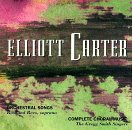| All Artists: Carter, Rees, Gregg Smith Singers Title: Warble for Lilac-Time / 3 Poems of Robert Frost Members Wishing: 1 Total Copies: 0 Label: Composers Recordings Release Date: 6/13/1994 Genres: Folk, Pop, Classical Styles: Vocal Pop, Opera & Classical Vocal, Historical Periods, Modern, 20th, & 21st Century Number of Discs: 1 SwapaCD Credits: 1 UPC: 090438064828 |
Search - Carter, Rees, Gregg Smith Singers :: Warble for Lilac-Time / 3 Poems of Robert Frost
 | Carter, Rees, Gregg Smith Singers Warble for Lilac-Time / 3 Poems of Robert Frost Genres: Folk, Pop, Classical
|
Larger Image |
CD Details |
CD ReviewsA perfect example of Carter's underrated early work. 12/31/1998 (4 out of 5 stars) "The pieces contained on this disc may well be among the most underrated in 20th Century American music. While the sound and performances on this disc leave a bit to be desired (when will Dawn Upshaw record the brilliant "Warble for Lilac Time" or "Voyage"?) this is still an entirely worthwile disc in that it contains nearly all of Carter's early vocal music. In addition, these are the arrangements for large ensembles. Recordings of some of these works arranged for soloist and piano are available, but the orchestral versions are more effective. It is hard to understand why these pieces continue to be so little-known. They are very accessible, easily describe as beautiful--words not often associated with Carter's post-1948 output. Carter's early style more closely approximates Barber, or the neo-romanticism of Stravinsky than the starkly dissonant, incredibly complex music most listeners think of now as typical Carter. The intricacy of Carter's writing is still what sets it apart, though. This collection's most straightforwardly lyrical selection, "Voyage", is far more tightly woven, and less obvious than, say, Barber's "Knoxville:Summer of 1915". "Three Poems of Robert Frost" makes fresh, daring use of the guitar with soprano and orchestra. "Musicians Wrestle Everywhere" and "To Music" are masterworks for unaccompanied mixed choir. All the pieces mentioned thus far deserve a place in the standard repertoire of ensembles capable of playing them. Whatever Carter's reasons for taking on the dramatic stylistic change that started with 1948's "Sonata for Cello and Piano" (which has produced plenty of great music), even Carter's own doubts about the worthiness of some of his early music will surely be overcome as audiences recognize the young genius captured in these stunning works."
|

 Track Listings (12) - Disc #1
Track Listings (12) - Disc #1